The Chinese New Year, also known as the Lunar New Year, is about celebrating the new year and welcoming good fortune. It’s also about removing any old, negative energy from the previous year.
The Lunar New Year typically begins with the second new moon after the winter solstice, which can occur in January or February and lasts for 16 days until the full moon arrives.
This year, the New Year begins on 10th February and is celebrated not only in China but, among many East and South-eastern cultures, such as Vietnam, Korea, Japan, and many others.
China’s Lunar New Year is known as the Spring Festival or Chūnjié in Mandarin, while Koreans call it Seollal and Vietnamese refer to it as Tết.
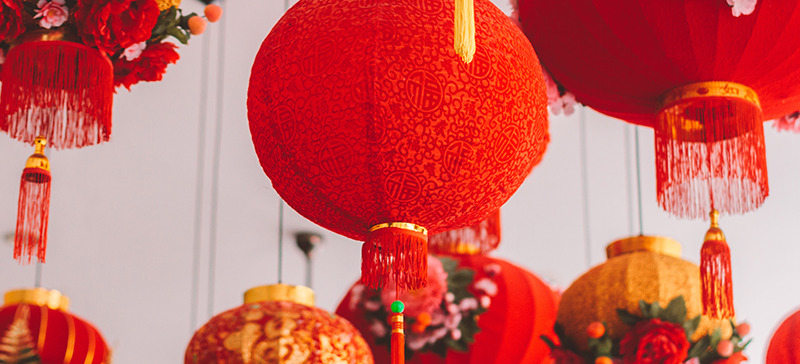
Each culture celebrates the Lunar New Year differently with a range of foods and traditions that symbolise prosperity, abundance, and togetherness. In preparation for the Lunar New Year, homes are thoroughly cleaned to get rid of negative spirits, which may have been collected during the previous year.
In China, the New Year is traditionally a time to honour ancestors, it has also become a time to feast and visit family members and is considered the most important festival in China. Often referred to as the Spring Festival, the new year also celebrates the arrival of spring and new beginnings.
Different regions within China have varying customs and traditions, but all share the theme of seeing out the old and welcoming luck and prosperity in the new.
Good Luck
There are certain beliefs and traditions, which are said to bring Good Luck for the year ahead.
Red is the main colour of the Chinese New Year festival, as red is believed to bring prosperity and good energy. Red wards off evil spirits and negativity, so many houses are adorned with red lanterns and decorations.
Giving out red envelopes (hóngbāo) which contain money, to family and friends, is said to symbolise good wishes for the year ahead. You may think the importance of the hóngbāo is the money inside, but it is actually the envelope itself, as the red brings good luck and prosperity. The amount given inside should never include the number 4, as four in Chinese sounds like the word for death.
Other popular gifts are tea, fruits, and sweets.
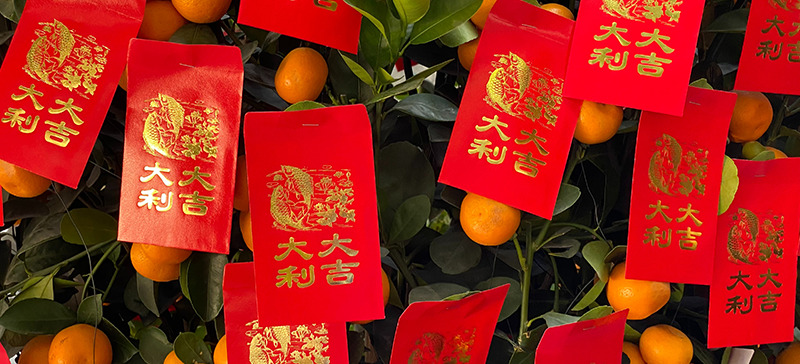
On the last day of Chinese New Year, there is often a Lantern Festival, parades, dragon dances and fireworks. These activities are said to help scare away any evil and welcome in the prosperity of the new year.
There are some superstitions centred around things that you must never do during the Lunar New Year, as these have negative implications.
- Do not sweep up on New Year’s Day, otherwise, you’ll sweep all your good luck away.
- Do not eat porridge for breakfast, otherwise, you may become poor in the coming year.
- Don’t wash your clothes or hair on New Year’s Day, or you may wash away good fortune.
- Never give wallets as gifts for New Year’s, as this symbolised loss of fortune.
- The Chinese word for pears sounds the same as ‘parting’ and so considered bad luck.
Chinese Lunar New Year – Traditional Foods
Certain dishes and foods are eaten during the festivities due to their symbolic meanings. Many of these traditional foods are considered good luck, due to their pronunciations or appearances.
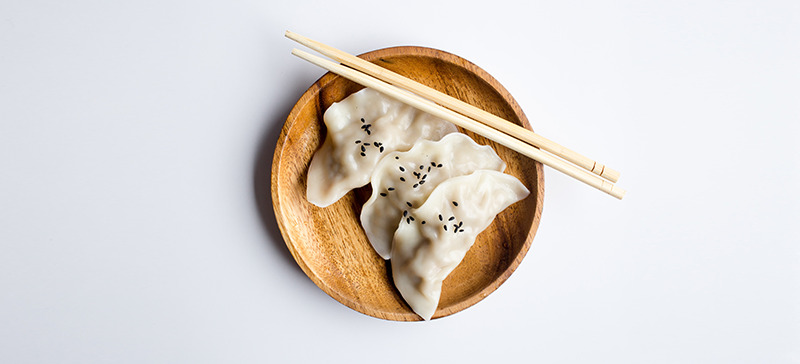
Some of the most common food for Chinese New Year include:
Dumplings – Wealth
Legend has it that the more dumplings you eat during the Lunar New Year celebrations, the more money you can make in the coming year.
Fish – Prosperity
Typically served as the last course of a Chinese New Year’s Eve meal, to bring good luck. In the Chinese language, the pronunciation of “fish” is the same as that of the word “surplus.”
Sweet Rice Balls — Family Togetherness
The main food prepared for the Chinese New Year Lantern Festival. The round shape is associated with reunion and being together.
Noodles — Happiness and Longevity
The length of the noodle and the preparation of making sure they are unbroken whilst cooking is symbolic of the longevity of life.
Tangerines and oranges – Success
In the Chinese language, the pronunciation of “orange” sounds the same as the word for success, so eating and displaying the fruit, is believed to bring good luck and fortune.
Sweets – sweetness and happiness
Eating and sharing sweets indicated that you will have a sweet life in the next year. Gifting and eating sweets or desserts is an important part of the Chinese New Year celebrations.
Nuts – longevity, happiness, and health
The Year of The DRAGON
Each year of the Lunar calendar is represented by one of 12 animals and a corresponding element.
2024 is the year of the Wood Dragon.
The Dragon is a symbol of power and wealth – 2024 is predicted to be a year of growth, progress and abundance.
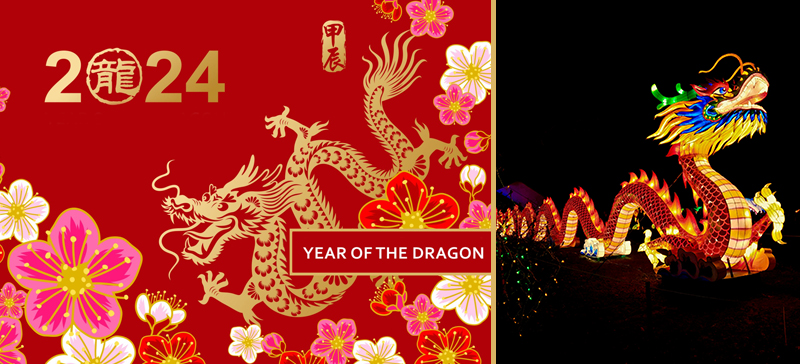
Previous ‘Years of the Dragon’ include 1928, 1940, 1952, 1964, 1976, 1988, 2000, 2012.
The 12 Chinese zodiac animals are not only used to represent years in China but are also believed to influence people’s personalities, careers, compatibility, and fortune.
Those born in the Year of the Dragon are believed to be ambitious, energetic, and charismatic, often inspiring others with their passion and enthusiasm, they are considered to be natural leaders.
John Lennon, Bruce Lee, Martin Luther King Jr, Rihanna, Shakira, Adele, Ringo Starr, Shirley Temple, Christian Dior, Sandra Bullock, Boris Johnson, Reese Witherspoon, Ronaldo, Rachel Welch, and Tom Jones are all Dragon signs.
Each zodiac sign is associated with one of 5 elements, Wood, Fire, Earth, Water and Metal.
Wood represents vitality and creativity, while the dragon is related to success, intelligence and honour in Chinese culture.
This combination makes people born in the Year of the Wood Dragon full of energy and drive. They dream of changing the world and are good at coming up with innovative ideas and implementing them. They are perfectionists and will not give up on their goals easily.
Chinese Zodiac Animal Characteristics
Rat (1948, 1960, 1972, 1984, 1996, 2008, 2020)
Quick-witted, resourceful, versatile, and kind.
Ox (1949, 1961, 1973, 1985, 1997, 2009, 2021)
Patient, kind, stubborn, and cautious
Tiger (1950, 1962, 1974, 1986, 1998, 2010, 2022)
Brave, confident, competitive, unpredictable.
Rabbit (1951, 1963, 1975, 1987, 1999, 2011)
Popular, compassionate, and sincere
Dragon (1940, 1952, 1964, 1976, 1988, 2000, 2012)
Confident, intelligent, enthusiastic.
Snake (1953, 1965, 1977, 1989, 2001, 2013)
Charming, gregarious, introverted, generous, and smart
Horse (1942, 1954, 1966, 1978, 1990, 2002, 2014)
Animated, active, energetic.
Sheep (1943, 1955, 1967, 1979, 1991, 2003, 2015)
Mild-mannered, shy, kind, and peace-loving
Monkey (1956, 1968, 1980, 1992, 2004, 2016)
Sharp, smart, curious.
Rooster (1945, 1957, 1969, 1981, 1993, 2005, 2017)
Independent, practical, hard-working, and observant
Dog (1946, 1958, 1970, 1982, 1994, 2006, 2018)
Lovely, honest, prudent.
Pig (1947, 1959, 1971, 1983, 1995, 2007, 2019, 2031)
Loving, tolerant, honest, and appreciative of luxury
The Chinese zodiac signs said to have the most luck in 2024 are Rats, Pigs and Monkeys.
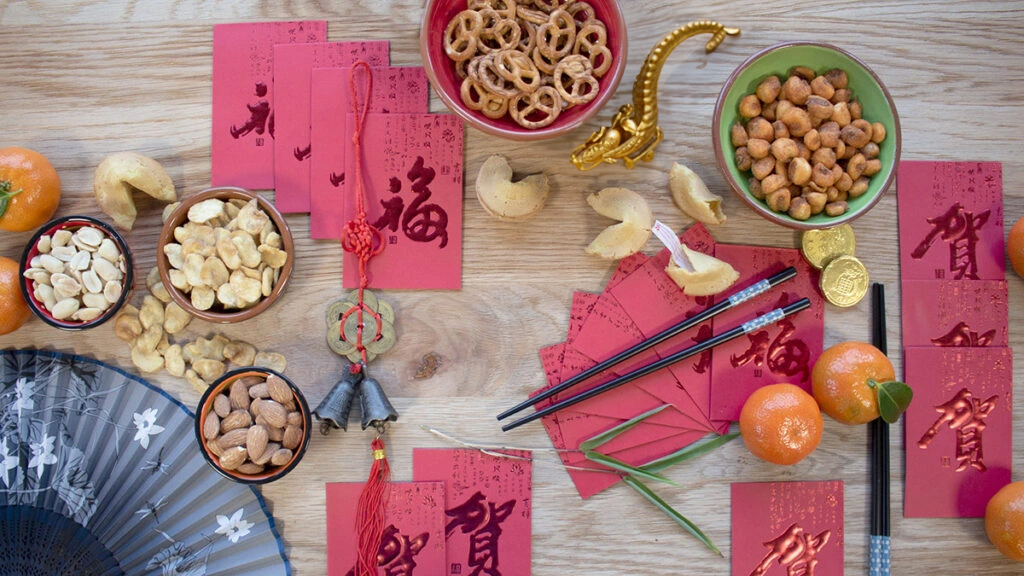
Why not find some creative ways to share in the celebrations of the Lunar New Year, perhaps by gathering with friends and family over traditional food? You could decorate your house with red lanterns, and accessories to bring good fortune to you and your visitors. You could even give out your own red envelopes to family members.
As food and gathering with friends and family is such a key part of celebrating the Lunar New Year, a hamper is a wonderful way to send your good wishes and good fortune to family and friends near and far. We have a selection of delightful red and orange hampers, perfect for gifts.
-
 Delectable Delights Letterbox£22.69 Inc VAT
Delectable Delights Letterbox£22.69 Inc VAT -
 Box of Indulgence£42.17 Inc VAT
Box of Indulgence£42.17 Inc VAT
-
 Tea & Treats£26.99 Inc VAT
Tea & Treats£26.99 Inc VAT -
 The Extravagance£115.00 Inc VAT
The Extravagance£115.00 Inc VAT
